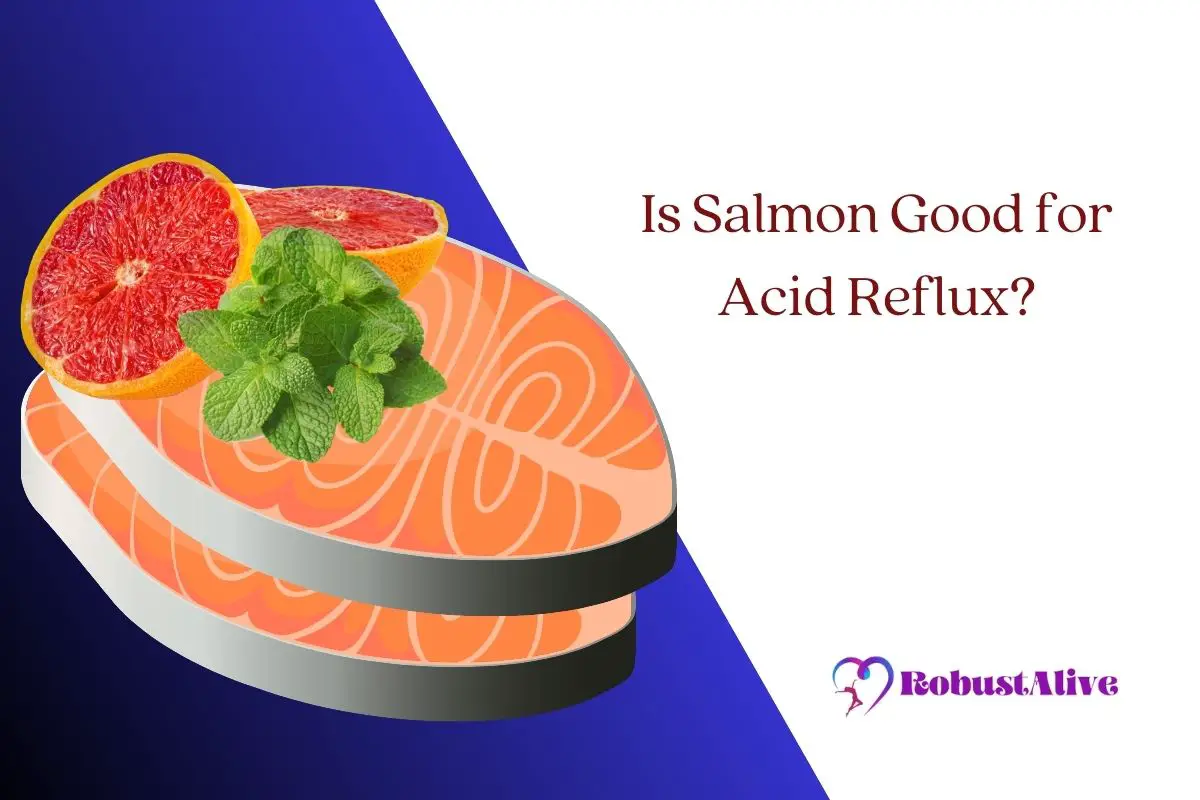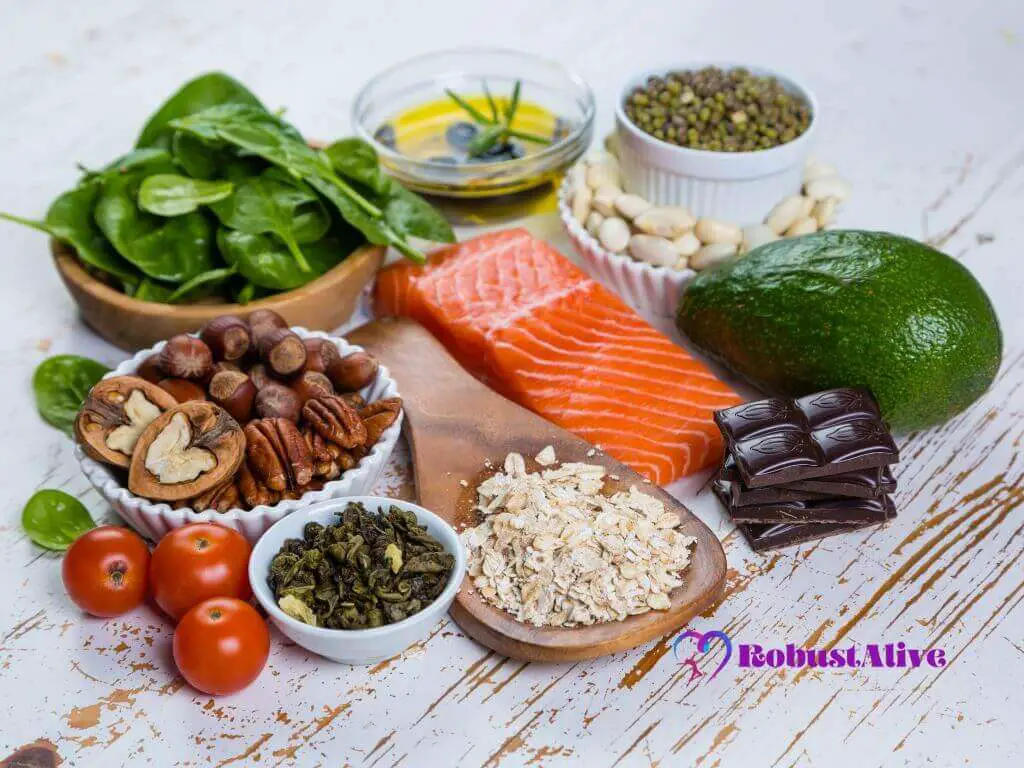Is Salmon Good for Acid Reflux? Find Out Here!

Salmon is one of the most popular and flavorful foods. It is an oily fish that is often categorized according to the ocean it is found in. Salmon appears to have a great nutritional profile and a ton of data supporting a range of health advantages.
But is salmon good for acid reflux?
Yes, salmon is good for acid reflux because it includes omega-3 fatty acids. The omega-3 fatty acids of this tasty fish support healthy gut flora and maintain the integrity of the stomach lining. As long as salmon is not fried in excess oil, it is safe for acid reflux. Further, salmon contains protein, vitamins, minerals, and other essential nutrients.
Is Canned Salmon Good for Acid Reflux?
Canned salmon is a delicious and beneficial food for acid reflux and heartburn sufferers. If you prepare it healthfully, it does not cause acid reflux. Salmon in a can have already been cooked; all you need to do is drain the liquid for eating or cooking. If you want to, you can remove the skin before serving. That said, some canned salmon contain vinegar. The acetic acid in vinegar may trigger acid reflux and irritate the esophagus.
Is Raw Salmon Good for Acid Reflux?
Since salmon is one of the lightest fish, it is very easy to digest. However, raw salmon can be hard to digest for people suffering from acid reflux. Especially during pregnancy, avoid eating raw salmon. Lightly cooked salmon is much better for acid reflux than raw salmon.
One of the healthiest ways to eat raw salmon is with sushi. Sushi contains no additives, which is suitable for the digestive system. So this simple preparation of raw salmon with sushi minimizes the chances of triggering your acid reflux.
Is Grilled Salmon Good for Acid Reflux?
Generally, grilling allows fat to drop out as the food cooks, which helps to minimize the amount of fat in our diet. This makes grilling salmon a reasonably safe cooking method for people who have acid reflux.
In addition, you can eat some green salads with your grilled salmon. However, many barbecue staples can still cause reflux, no matter how they are prepared. So give it a try first. Avoid this grilling method to keep your stomach healthy if it triggers acid reflux.
Is Salmon Acidic?
According to a report by NBI, Salmon has been listed in the acidic food group. However, salmon has a mild acidity. If cooked with fewer spices, it will be more beneficial for health.
The pH range of freshly cooked salmon is 5.3 to 6.4. Be mindful that a food’s propensity to cause the body to become acidic or alkaline has nothing to do with the food’s actual pH. For instance, lemons are incredibly sour and acidic. However, the end product it produces is highly alkaline during digestion and absorption.
Health Benefits of Eating Salmon

Graphics Credit: Robustalive.com
Including fish in your diet has several positive health effects. Salmon is known to improve heart health & brain function. It also works as an anti-inflammatory and contains antioxidant properties. This article will shed light on the several health benefits of eating salmon.
1. Healthy Heart
When it comes to heart health, salmon is renowned as a superfood. Omega-3 fatty acids, antioxidants, and vital vitamins help lower blood cholesterol and blood pressure levels. This eventually reduces the risk of developing cardiac problems like heart attacks and arrhythmias (abnormal heartbeats). Salmon also enhances heart health by lessening the cellular harm of free radicals.
2. Supplies Anti-Oxidant
Salmon contains astaxanthin, which has anti-inflammatory and antioxidant properties. It shields cells from oxidative damage and enhances how important organ cells operate. Additionally, astaxanthin improves immunity and lowers the risk of neurological illnesses.
3. Boosts Brain Function
Fish serves as “brain food.” Salmon has high DHA concentrations, vitamin D and A levels, and selenium levels that improve brain health and function. Since these substances are known to enhance cognition and learning abilities, supplements containing them are frequently used to treat neurological conditions (including Alzheimer’s and Parkinson’s disease) in adults as well as attention deficit hyperactivity disorder (ADHD) in children.
4. Reduces Inflammation
Oily fish plays an essential role in reducing the consequences of inflammation. And this fact is the key to treating various chronic conditions, such as diabetes and cancer. Additionally, omega-3 fatty acids help persons with osteoarthritis ( a common form of arthritis that occurs in the hips, hands, and knees) by lowering joint inflammation.
5. Great for Eyesight
Omega-3 fatty acids and vitamin A, abundant in salmon, support eye health and reduce the risk of conditions like dry eye syndrome. It is tasty and will also improve your eyesight.
Risk Factors of Eating Salmon
An allergy to fish may not manifest until maturity. According to one study of ACAAI, up to 40% of those who claimed to have a fish allergy did not experience symptoms until they were adults. Therefore, if you experience allergic reactions after eating salmon, please call your doctor immediately.
Nutrition Chart of 100 gm Servings of Wild Salmon Vs. Canned Salmon Vs. Farmed Salmon:
I have prepared a table sourcing from USDA and other trusted sources [1, 2, 3] for our reader’s convenience. You can easily compare the nutrient value of wild, canned, and farmed salmon and add it to your diet chart.
| Nutrient | Wild Salmon | Canned Salmon | Farmed Salmon |
|---|---|---|---|
|
Protein |
25.4g | 20.55g | 20.35mg |
| Calories | 182 | 144 |
206 |
|
Fat |
8.1g | 6.3g | 4.4g |
| Omega3 Fatty Acid | 2.2gm | 1.9gm |
1.2gm |
|
Cholesterol |
71mg | 59mg | 53 mg |
| Calcium | 15mg | 220mg |
9mg |
|
Potassium |
628 mg | 336mg | 363mg |
| Sodium | 56mg | 403mg |
58mg |
|
Iron |
1mg | 0.64mg |
0.35mg |
Compared to farmed salmon and canned salmon, wild salmon is said to be more nutrient-dense. Omega-3 fatty acids, iron, and fat, are higher in wild salmon than in farmed salmon.
Canned salmon is rich in calcium & sodium compared to the other two types of salmon.
Wild salmon, due to its natural diet and active lifestyle, has a deeper flavor and harder texture than salmon raised on farms. Conversely, salmon raised on farms tend to be gentler and softer due to their restricted diets and activity. Although the flavor of canned salmon can vary, it typically has a more delicate flavor than fresh or frozen salmon.
Each type of salmon—wild, farmed, and canned—has distinct advantages & nutrient value. You can choose your favorite one by analyzing the above-given table.
Smoked Salmon Recipe for Acid Reflux

Graphics Credit: Robustalive.com
Salmon that has been properly smoked is one of those easy, luxurious delights that is so rewarding. The aim is to achieve the ideal balance of the delicate salmon flavor, smoke, salt, and a touch of sweetness. This dish can be enjoyed by those with acid reflux while providing their bodies with some nutrition. You get something remarkable when those components work harmoniously together. This recipe is ideal if it is your first time making salmon. So prepare some fish to smoke now!
Equipment:
- A pellet smoker likes a Traeger, an electric smoker like a Masterbuilt.
- For bringing, use a sheet pan or plastic bag.
- You can use fish tweezers to remove the salmon’s pin bones.
- Use aluminum foil because it makes it simple to transfer food to and from the smoker and clean up afterward.
- You can keep a probe thermometer.
Ingredients:
- Salmon
Try to choose fresh, wild salmon. Fresh-frozen wild salmon will still be excellent if wild salmon is not in season. Instead of dividing the fish into smaller sections, use a whole filet to make it simpler to handle and keep the fish wet during cooking.
- Kosher Salt
I suggest purchasing Diamond Kosher salt for this dish. If using other salt types, ensure you’re seasoning food appropriately.
- Brown Sugar
Just enough to balance out the dish’s sweetness. You can substitute granulated sugar. However, the molasses in the brown sugar will impart caramel flavor.
- Wood Chips
Alder wood chips for a pellet smoker to give the fish a fantastic flavor.
How to Store Smoked Salmon?
You can store salmon in the refrigerator for up to three weeks and one week after opening. Additionally, it has a three-month freeze term. I recommend keeping items in their original packaging or carefully wrapping them in plastic to avoid drying out.
Frequently Asked Questions (FAQs)
-
Does Salmon Help GERD?
Low-fat lean meats that might lessen acid reflux symptoms include chicken, turkey, fish, and seafood. Consider grilling, broiling, baking, or poaching them. Yes, salmon is good for GERD. However, fried salmon is not ideal for GERD. Smoked salmon is more suitable for GERD.
-
Is Salmon Good for Digestive Issues?
Salmon has omega-3 fatty acids, which help reduce inflammation. Food intolerances, digestive disorders, and inflammatory bowel disease can also bring on inflammation in the gut. Consuming the right amount of salmon will ease the discomfort and enhance digestion.
-
Does Salmon Help with Gas or Bloating?
Omega-3, an anti-inflammatory found in salmon, is suggested to reduce bloating and gas.
-
What Organ Is Salmon Good for?
It is suitable for heart, joint inflammation, and brain function. Salmon has anti-cancer properties. Selenium, present in salmon in sufficient amounts, prevents thyroid cells from being harmed by free radicals during the generation of thyroid hormone, hence maintaining healthy thyroid function.
-
What is Healthier, Salmon or Chicken?
The advantages of fish tend to be slightly higher than those of chicken, particularly regarding the Omega-3 level, even though they are both excellent sources of protein and add to your nutritional profile.
-
How Often Can You Eat Salmon?
According to the FDA, salmon falls into the best-choice category. You can have salmon two to three times a week. ( 8-12 ounces). However, overeating salmon can cause stomach issues. Therefore, it’s better to stick to a healthy meal plan to benefit from this tasty fish.
Bottom Line
This article beautifully answers your question, is salmon good for acid reflux? It is crucial to remember that every person’s body responds differently, and some people may have acid reflux after consuming salmon. Therefore, it is advised to keep track of any symptoms and, if necessary, see a healthcare provider. Overall, including salmon in a balanced diet and other nutritious food choices can help reduce acid reflux symptoms and promote overall health.





